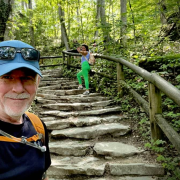10 Practices to “Keep Your Head in the Game” of Life! | Healthy Aging Series: Part 12
I’m on a Southwest flight 31. Headed to Chicago and then to Cancun, Mexico. Vacation mode. With my wife. We work hard at helping others. We give a lot of ourselves. Often, times we see a lot of pain and suffering. I see broken families. I see men and women in despair, and yes, I see hopelessness. All of this takes a toll on us on us. That’s what life does.
Life Can Be Messy
Throughout our lives we experience the loss of jobs, of first loves, or the loss of money in the stock market. We live through the stress of a spiteful supervisor, the stress of an irrational neighbor, the stress of living in a partisan country. We carry the burden of wayward children and grandchildren, the burden of an ailing partner, the burden of a dying parent. We endure the disappointment of unfulfilled dreams, unrequited love, and undeserved betrayals. Life can be a mess. How prepared are you for those messes, the mental and emotional upheaval‘s? How psychologically resilient are you? How quickly do you rebound from the disappointments, from the unexpected adversities, and from unwanted changes?
What is Psychological Resiliency?
I have written in an earlier blog about resiliency. In some ways it helps to understand that physical resiliency is the opposite of physical vulnerability or physical fragility. Psychological vulnerability and fragility are similar in many ways. Psychological resiliency acts as a buffer between us and our adversity and helps preserve our emotional balance or what some call homeostasis. Why is this important and what can we do about it?
Psychological resiliency is important because of the body-mind connection. If we are fragile psychologically or physically it affects our mental resiliency. People that are physically frail often suffer emotionally and psychologically and vice versa.
If psychological resiliency is that important, how does one become more psychologically resilient? How does one develop emotional stamina, mental strengthen and endurance? The mindfulness community teaches the phrase “What we practice grows stronger. The AA community refers to the 12 steps and encourages its members to practice the principles in all their affairs.
Becoming and maintaining our psychological resilience takes practice.
In the same way that you need good nutrition and exercise for physical resilience, you need good mental nutrition and mental exercise for psychological resiliency. Becoming resilient and maintaining our psychological resilience takes practice. Much like you need good nutrition and exercise for physical resilience you need good mental nutrition and mental exercise to grow your psychological resilience. It’s all about diet and exercise.
Living My Life by Slogans (Practices)
I have based much of my own psychological resiliency on slogans and mottos that reflect resiliency practices. What follows are a number of those slogans that I encourage you to practice.
1. You have to adjust to the things that won’t adjust to you. I believe this means living life on life’s terms. There are a lot of stressors and things that happened to us throughout our years and our expectations of life, and these events can create a reactivity to the stressor that takes its toll on us both mentally and physically. Excepting the things that we cannot change is part of the process of developing resiliency.
2. Easy does it. I have learned to not push so hard when pursuing my wants and needs. As a therapist I’ve learned that working with families involves being a change agent. I use the Easy-Does-It approach when is work with families. This means taking it slow and not pushing so hard for change.
3. The golden rule: Do unto others as you would have them do unto you. If there is any guiding principle in life that I use, it’s the practice of treating others the way that I want to be treated. Practicing this principle eliminates conflict in relationships.
4. Memento Mori: “Remember that you will die.” I think about dying every day. There’s a lot to be said about this. Stoics believed that life only has meaning in light of dying. Resiliency grows as you make the most of each day, and that comes as we appreciate the meaning of each day.
5. “I treat everyone like my peer.” A few years ago I was watching an interview with Norman Lear, the creator of “All in the Family” and “The Jeffersons.” At the time he was 93 and his interviewer asked him how it was that he seemed so youthful. His response was, “I treat everyone like my peer.“ There are practices that can alleviate resistance and difficulty in relationships. This is a practice that helps people or puts people at ease when they are with us and allows us to create it environment for them and promotes your resiliency.
6. Do the Next Best Thing. Life can present us with difficult decisions to make in the future. We fast forward at times into our future and think about all the things that we might face. We become overwhelmed by what “might be.” Doing the next best things means focusing on the here and now and dealing only with the problems that you face now. The future can rob you of your serenity and contribute to your loss of resiliency.
7. Build a Repertoire of Positive Sentiment. I go places with my wife to build a repertoire of positive sentiment. I hike for the same reason. I backpack for the same reason. I read and listen to new music for the same reason. I spend time with my sons and granddaughters for the same reason. This repertoire is a protect bubble that protects you from the hardships of life.
8. Balance Giving and Receiving. I know you’ve heard the slogan: It’s better to give than receive. This is BS. You must be a receiver for someone to be a giver. I love giving, but only being a giver ensures that you will become cynical and burned out. Learn to be a receiver.
9. Balance Work with Play. If you are going to be resilient you must play. You must have fun. You must be a little boy or little girl and play in the mud and make mudpies. You must make playdough cookies. You must laugh. You must tickle and be tickled.
10. Spend Time Alone in Your Head: -reflecting -creating -using active imagination. There is the saying in the religious world, “Let go and let God!” I prefer, “Let go and let the wonderful, hidden thoughts that you’ve repressed and suppressed express themselves in those quiet moments that you spend by yourself.” I often do this while hiking by myself in the Jefferson Memorial Forest. I also suggest one of the Parklands of Floyd’s Fork parks. Reflect on the day. Reflect on the year. I love thinking back on the old year each New Year’s Day. Not all the memories are good but reflecting in them is necessary.
These are my life-affirming practices. What are yours? What’s working for you? What gets you through the hustle and bustle of life? What helps you decompress from the stressors in life? What you practice is growing stronger.
This is part twelve in the Healthy Aging Series, written by Mark Neese, LCSW, BCBA. To see more entries in this series, click here.













